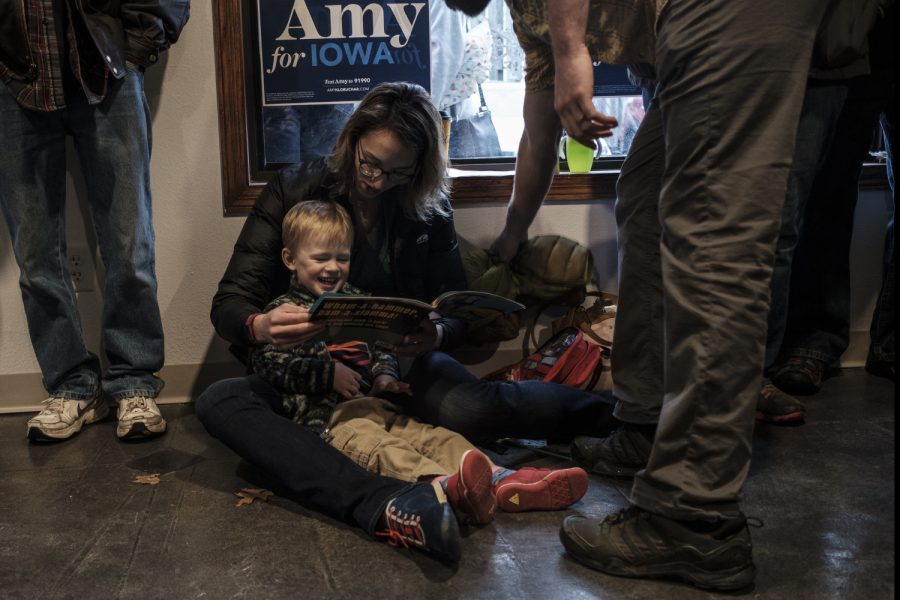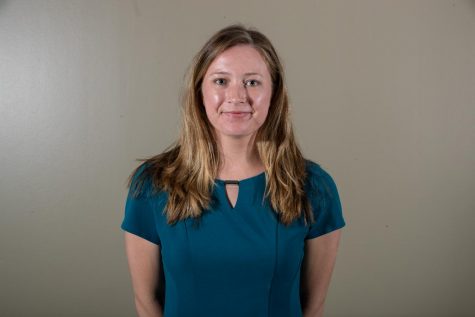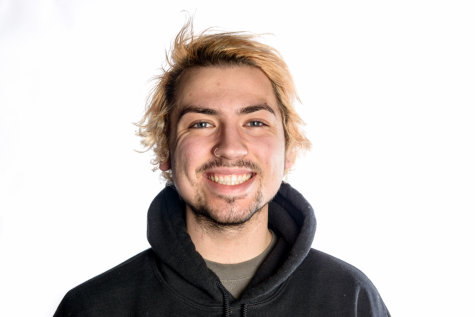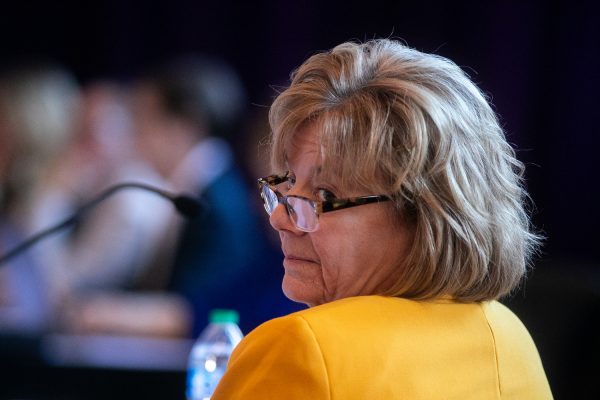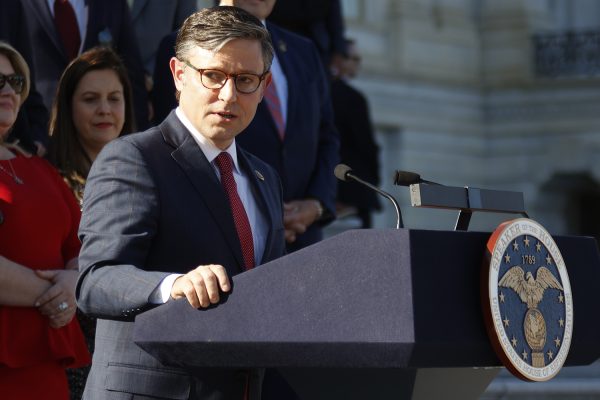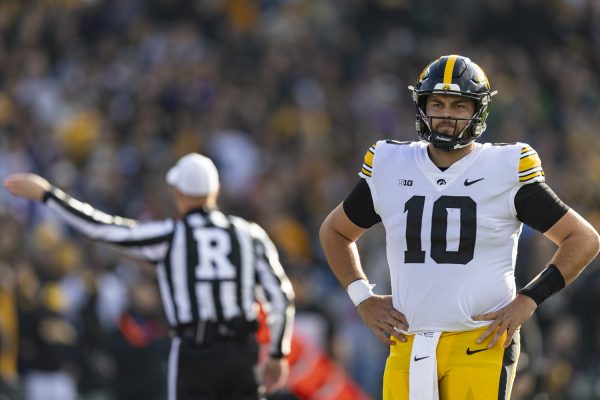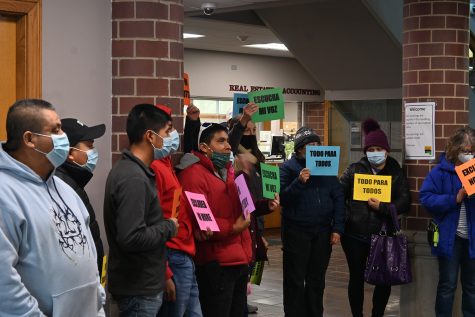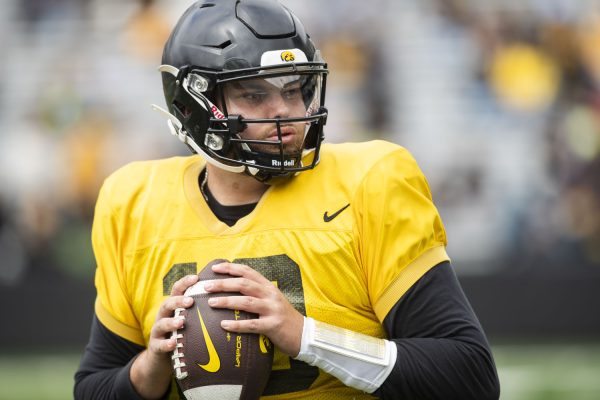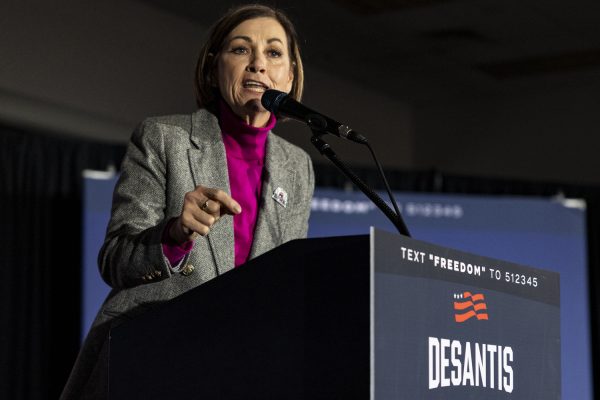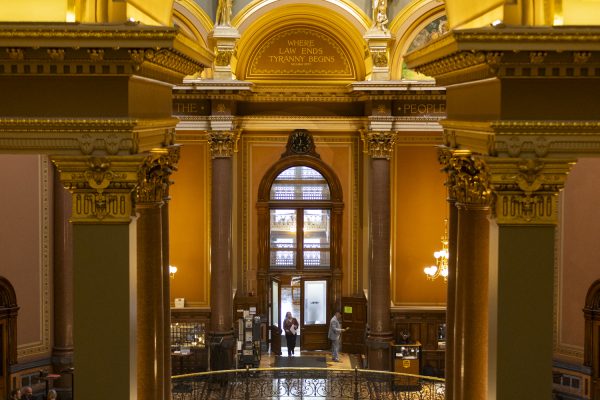Caucuses and kids: Making the big decision through a parent’s eyes
Iowa Democrats are bringing their kids out to caucus events, and while that comes with challenges, many say their kids’ future is the reason they want to evaluate the Democratic field in person.
Mary Kosloski reads with her son Felix during an office opening event for Senator Amy Klobuchar, D-Minn. in Iowa City on Dec. 28.
January 21, 2020
Emily Johnson and Ian Cawley started preparing for a Cory Booker presidential campaign event in North Liberty the night before, having discussed and planned for days in advance. They weren’t campaign staff, venue setter-uppers, or part of a Booker volunteer group; they were parents bringing their 5-week-old daughter, Edie Cawley, on what was her first nonhospital outing.
The couple packed a bag full of diapers, wet wipes, and a wrap before Booker’s Jan. 9 event. Johnson nursed Edie in the morning, trying to time the two-hour intervals between feeding so she and her husband could hear all or at least most of Booker’s speech.
The Democratic senator from New Jersey dropped his bid for the White House a few days after the event.
“What used to take five minutes now takes an hour and a half,” Cawley said of getting out the door in the mornings. “… We both wanted to see this event. We knew we couldn’t get a sitter for a couple hours during the day so we decided to make it a family outing.”
Keeping kids entertained and babies placated for hours in a crowded area during an Iowa campaign event is not an easy task. Booker’s North Liberty speech lasted well past the 40-minute mark and candidates across the board often begin their events later than advertised.
But they and other parents attending campaign events say the extra planning and hassle is worth it to participate in the caucuses and expose their kids, no matter how young, to the political process.
Johnson and Cawley, an Iowa City couple, plan to caucus with their daughter. Depending on their precinct, they could be engaging in a noisy, 1,000-person packed gymnasium for an hour or longer.
“Voting is one of the most important responsibilities we have,” Johnson said. “So the earlier that you get immersed in that as the idea that [voting is] just a thing that you do and not like a choice to make, but that that’s what you do. I think it’s really important, and who knows? She might be absorbing some stuff.”
“She really liked Cory Booker in the womb,” Cawley added.
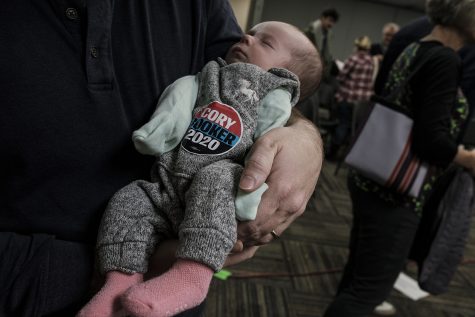
Ian Cawley hold his daughter Edie during a campaign event for Sen. Cory Booker, D-N.J., in North Liberty on Jan. 9.
Johnson laughed, explaining that during her pregnancy, she’d felt movement when she heard Booker speaking on a podcast.
“It was one of the first times we felt her kick, so we always joked that she liked Cory,” Johnson said.
The Iowa City couple haven’t set their caucus choice in stone yet. Johnson said she’s looking less at a candidate’s specific policies, and more for a candidate who can “get through the logjams in Congress.” She’s voted split ticket for several years, casting ballots for Republicans in local races and a Democrat in recent presidential elections.
For other parents, seeing national figures is as much a learning experience for their kids.
Iowa City resident Megan Pai’s 4-year-old daughter, Maddie, talked nonstop at home about Andrew Yang after seeing his ads, peppering her mom, who is white, and dad, who is Taiwanese American, with questions about race and identity.
So, the couple decided to take their two daughters to see Yang in person at a University Heights bookstore Dec. 14.
“I think it’s because it’s like the first time she’s seen an Asian, literally, on TV. And so she’s just been asking lots of questions about him… Like she’s been asking me if he’s a real person,” Pai said. “And so I thought we would come and check it out because she was very curious.”
At its beginning, the field for the Democratic nomination was one of the most diverse in the country’s history. Since the departure of several prominent nonwhite candidates from the race, Sens. Booker and Kamala Harris from California and former Housing and Urban Development Secretary Julián Castro, Yang is the one nonwhite candidate who made a debate stage in December. No candidates of color landed a spot in the Jan. 14 Democratic presidential debate in Des Moines.
Although kids can’t caucus or vote, their presence is a strong factor in political decision making for many families.
Two University of Iowa geology professors — Bill Barnhardt and Mary Kosloski — brought their 2-year-old son Felix, along with a Pixar Cars backpack and a construction site his uncle got him for Christmas, to see U.S. Sen. from Minnesota Amy Klobuchar one brisk day soon after Christmas.
It wasn’t Felix’s first event. (He, for the record, answered, “Dad!” enthusiastically when asked whom he was supporting for president). The three had also seen Elizabeth Warren during a Johnson County stop, where Barnhardt got to pose a question to the senator from Massachusetts.
“He asked, ‘OK, my kid’s going to be voting in 16 years, which is a while, but if you have two terms…what is America going to be like after two terms of a Warren presidency?’ And she really sold me on her vision when I think about what’s going to be the best possible future for him,” Kosloski said of her husband’s question.
Warren answered by talking about a sweeping affordable-housing plan and the importance of addressing climate change, which Kosloski said is especially important to them as geologists who understand in-depth the magnitude of the environmental costs of inaction.
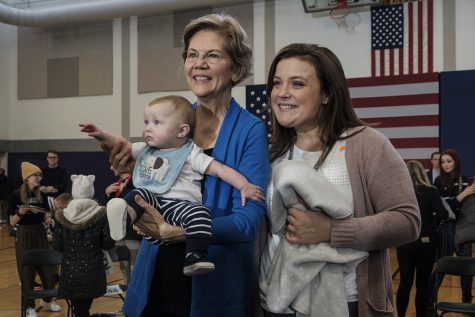
Senator Elizabeth Warren, D-Mass. takes a photo with a mother and child following a town hall event on Dec. 21.
The couple said, laughing, that it took quite a bit to keep their son entertained at campaign events. He liked to run through people’s legs, especially in crowded rooms such as at Klobuchar’s Iowa City office opening.
Kosloski said she’d be happy to see some form of activities for kids at caucus sites to ease the burden on parents who might want to bring their kids to caucus.
“We’ve never had the only kid at a campaign event and we’ve been to a lot of campaign events. And there’s always a lot — not a lot — but at least a handful of others there,” she said. She added that at campaign events, most people were accommodating. One stranger even rolled toy cars around with Felix on the floor during a Booker event.
Johnson County Democratic Party organizer John Deeth said the party’s caucusgoers can apply for an accommodation at the party website, which may include requesting child care at their caucus site on Feb. 3.
The caucusing process has often been criticized as inaccessible to people with disabilities, work conflicts, or those without child care. The Democratic National Committee set mandates for the 2020 nomination calendar for the caucuses to add an absentee option for people with caucus conflicts, such as taking care of kids at home. After the DNC vetoed a phone-in virtual caucus option, the national party approved the Hawkeye State for satellite caucuses, which could allow people who couldn’t get to their precinct site to caucus at the same time in a different place, such as a workplace, school, nursing home, or out-of-state location.
Young people shaping the political conversation
Presidential candidates are getting asked questions by young people too. At a stop in Iowa City, a young girl named Eleanor, who preferred to go by Bear, asked Warren if she would stop global warming.
“Yes,” Warren answered.
Climate change is especially an issue hailed by those under 18, who argue that policies by government now will be inherited by young people in the future.
In Iowa City, middle and high schoolers have spearheaded climate protests after 16-year-old Swedish activist Greta Thunberg began sitting out from school to bring attention to the threat of climate change. Thunberg visited Iowa City in October, drawing a crowd of a couple thousand, many of whom were young kids who came to see Thunberg on a day off from school.



